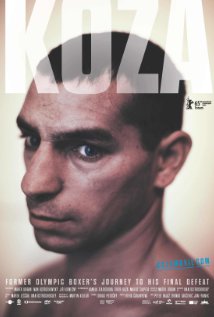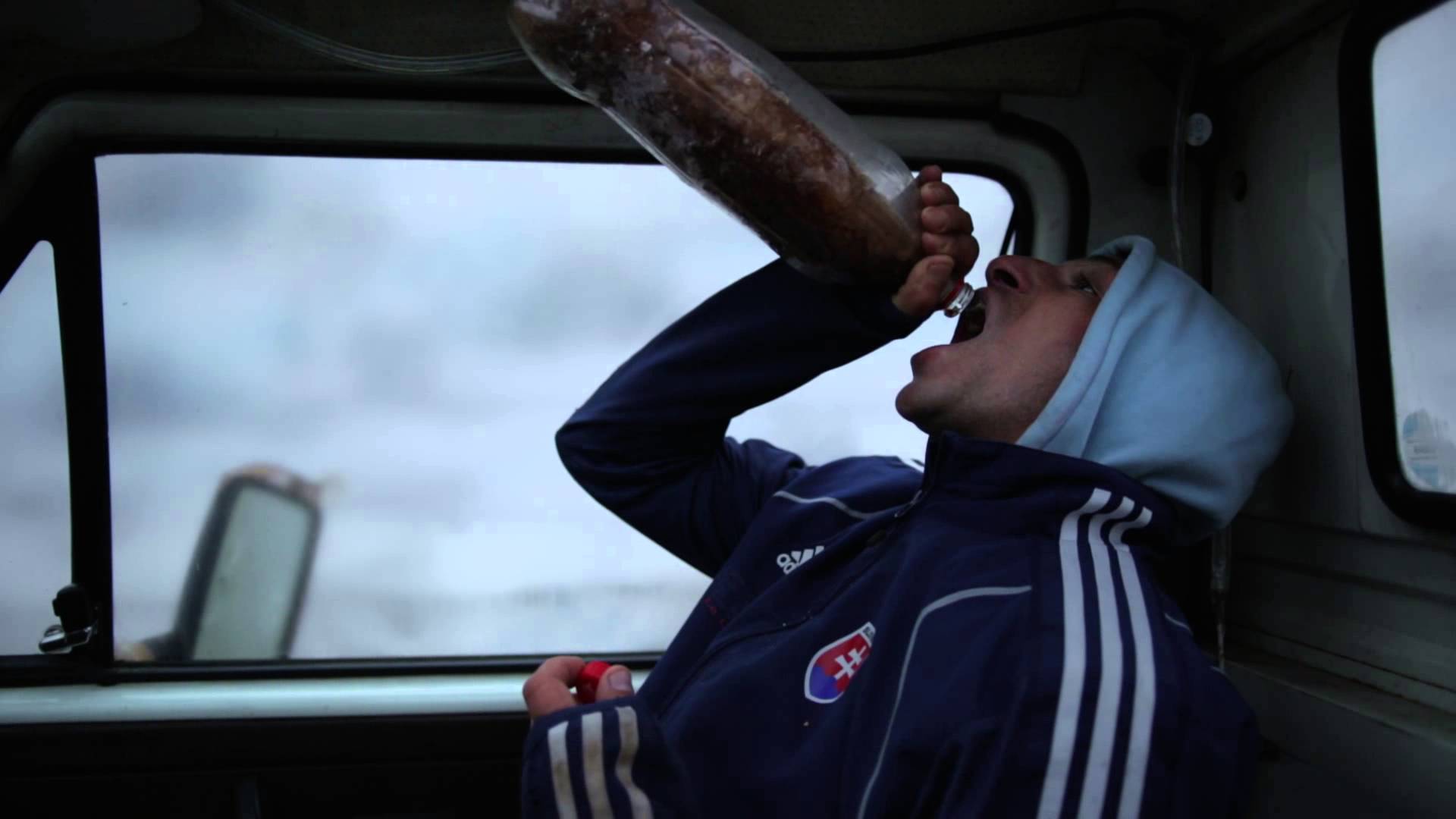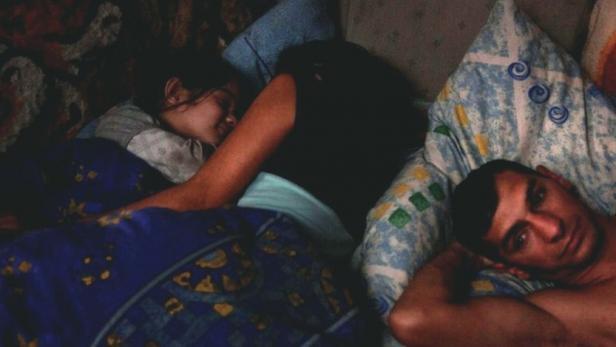Interview: Ivan Ostrochovsky on Directing the Slovak Oscar Submission 'Koza'
 Tuesday, December 8, 2015 at 6:02PM
Tuesday, December 8, 2015 at 6:02PM  Jose here. As Creed gains popularity in the awards season, it would be fascinating to juxtapose it with Ivan Ostrochovsky's Koza, the Slovak Foreign Language submission which also happens to be about a boxer. The main difference with both films is that in the very American Creed, boxing is a noble enterprise used by the hero to reclaim his position among the "gods" (it's no accident that in such an Oedipal drama, the leading character's name is Adonis). In Ostrochovsky's film, boxing is the means by which the leading character (played by real life boxer, and former Olympian, Peter Balaz) who goes by the nickname Koza (which means "goat") is trying to raise money to prevent his wife from having an abortion.
Jose here. As Creed gains popularity in the awards season, it would be fascinating to juxtapose it with Ivan Ostrochovsky's Koza, the Slovak Foreign Language submission which also happens to be about a boxer. The main difference with both films is that in the very American Creed, boxing is a noble enterprise used by the hero to reclaim his position among the "gods" (it's no accident that in such an Oedipal drama, the leading character's name is Adonis). In Ostrochovsky's film, boxing is the means by which the leading character (played by real life boxer, and former Olympian, Peter Balaz) who goes by the nickname Koza (which means "goat") is trying to raise money to prevent his wife from having an abortion.
Formally exquisite, and with a running time of a little over an hour, showing how great editing proves that less is indeed more, Koza is an exemplary work of art that combines documentary filmmaking and drama. Its un-romantic look at sports might prove revelatory to some (it certainly did to me) and Ostrochovsky's deep humanism should place him as a director to keep an eye on. He was also kind enough to answer a few questions I had about the film, including how he directed Balaz, and what an Oscar nomination might mean for his career.
Read the interview after the jump...
JOSE: How did you end up with Peter Baláž playing a version of himself in the film?
IVAN OSTROCHOVSKY: While writing the script, we were considering which of the Czech or Slovak actors would be capable to authentically impersonate a character of a Romani boxer. We didn't have to think twice to realize that there is no such professional, that's why we opted to write the script directly for Peter.
JOSE: What kind of direction do you give a boxer? Did it become a trainer/boxer dynamic, more than a traditional actor/director situation?
IVAN OSTROCHOVSKY: Because Peter is not a professional actor, the script was written with a minimum of dialogue, and I didn't need to direct him as a boxer, because he really is one. I would only need to direct his boxing if I'd chosen a professional actor for the role. An important factor was also that Zvonko, the second main character, used to be a film director, so he – unlike Peter – understood the necessity to maintain the meaning and especially rhythm of the scenes, as we were not going to use very much editing in the film. He was like a second director inside the frame.
JOSE: Sports films have traditionally been about pride/competition/sportsmanship etc, but yours is about sports as a way of survival. Koza isn't only into sports because he loves to box, but because he needs to make money for his family. Do you find that sports have been too romanticized in films, and is this something you wanted to shatter?
IVAN OSTROCHOVSKY: I wouldn't like to generalize. The competition in sports can also be a metaphor for a variety of life situations. From primal survival to the gluttonous competitiveness of the market economy. I think the strength and popularity of sports plots has to do a lot of us connecting competition to an image of a successful and full life. That is very effective on one side, but degrading to who we could become, on the other.

Regardless of the previous question, what are your favorite boxing movies?
I wouldn't say favorite. Of course, while writing the script I was watching a lot of them – from Raging Bull to the Slovak 60s classic The Boxer and Death. The main challenge for me was to link my personal experience and impression from Peter's real matches together with how box was pictured in films so far. Peter is 40 years old and he boxes most of his matches against younger and more ambitious boxers. It's not a very nice show to watch him getting beaten up.
That is why we wanted to get our feeling of destruction and decay, which felt very absurd, as well, into the film. Most of films about boxing are making the matches attractive, in a way. Sometimes even with roughness and naturalism, but always with dynamic editing, dynamic frame sequences, with the camera movement, with music. I didn't want Peter getting all beaten up to look “attractive”, that's why we've opted for long shots from a distance, which didn't formalize Peter's misery.
The fine line between drama and documentary in the film perfectly captures the state of modern television entertainment in which real people become "characters" so to speak. Is this something that fascinates you?
Personally, I don't really watch television, and that's why I associate the term “real” person with real life rather than with television production. It is interesting for me to watch how we become “characters” in our real lives. But maybe television entertainment, as despised as it is, still reflects a bit of that real life on screen.
Something remarkable is that Misa doesn't ask for permission to have an abortion, she is fully in control of her body. Is this an accurate representation of the state of women's rights in Slovakia or a plea to what it should actually be like?
Again, I wouldn't like to generalize. However, there's an ongoing discussion about abortion's (im)morality, even if every woman in Slovakia has to right to decide which is the correct option. The state should not interfere with personal matters of its citizens, in my opinion. It is very important to discuss topic of morality, however, I often have a feeling the economical topics became somehow more important for people. But I don't believe we are what our GDP makes us.
The camera work is absolutely gorgeous. Can you comment on juxtaposing moments of emotional darkness with beauty in the landscapes?
As soon as we knew, that Koza would be playing himself, and the other characters will be played by non-professional actors, we put more emphasis on the emotionality of the backgrounds and environments. It was clear to us, that we will have limited possibility of building that emotionality from the performances of the actors, so we replaced this “emotional loss” by feelings evoked by pictures, landscapes.

How has the journey of taking the film to different festivals been like? Has it brought more attention to Peter? Does he want a "comeback"?
Of course, it's very nice for everybody, not only for Peter, to be the center of attention once in a while. We, however, were preparing him for no miracle to happen because of the film, and that his life will more or less stay the same as it was, unless he himself will change it. No film can do that for a person. Peter, of course, understands that he's equally old for a career in a ring, as he is for an acting career. We are only trying – using the resources the film gained from festival awards and sales revenues – to start his coaching career. We would like him to coach kids from the ghetto he used to grow up in himself. However, someone should also make a film about the first half of his life – how a kid from a Romani ghetto got to Olympic games, that would probably be a bigger audience pleaser...
What would an Oscar nomination mean for the film?
A lot. As well as for Slovak cinema in general, as it is just waking up from a long sleep and didn't get to touch an Oscar before. But it would also be a great responsibility and pressure while making a new film. For Peter, as a person, it would mean the world, of course. Especially if he, while picking iron, knew, that there are people across the ocean thinking of him and crossing fingers for him.

Koza hasn't been picked up for distribution in the US.
 Ivan Ostrochovský,
Ivan Ostrochovský,  Koza,
Koza,  Oscars (15),
Oscars (15),  Slovakia,
Slovakia,  foreign films,
foreign films,  interview,
interview,  sports
sports 


Reader Comments (1)
Nothing can bet Rocky movie i said nothing.